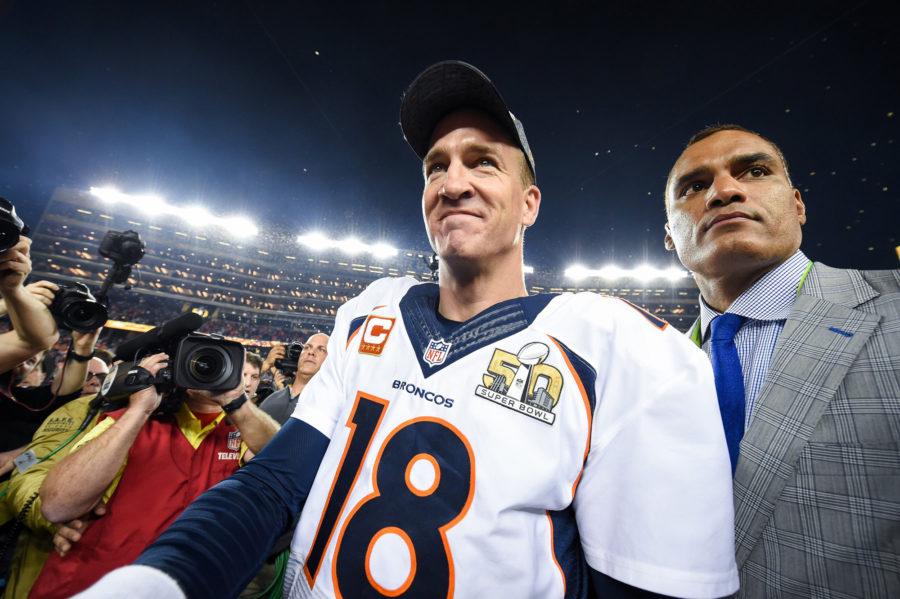Fans should not ignore sexual harassment by athletes
February 21, 2016
On Feb. 13, less than one week after the Super Bowl, the New York Daily News released a 72-page court document detailing sexual assault accusations made against Denver Broncos quarterback Peyton Manning nearly 20 years ago, an incident that seemed to be just a speck on the quarterback’s radar, but a life-changing event for the victim.
In 1996, while Jamie Naughright was evaluating Manning in the training room at the University of Tennessee, “entirely unprovoked, Manning decided to pull down his shorts and sit on Dr. Naughright’s head and face”. http://www.nydailynews.com/news/national/king-peyton-manning-squeaky-clean-image-built-lies-article-1.2530395 (on page 14 of the embedded document)
When her boss heard of the incident, he urged her not to call the police. Manning defended himself by calling the incident a “mooning” which she just so happened to see. He also explained that she had a “vulgar mouth” and was one of the guys, so the joke should have been well-received.
According to the documents, Naughright was told that she was “going to have to develop a tolerance of profanity” while she worked as a trainer for the athletic department at the University of Tennessee.
But, despite her efforts to change the hostile work environment to which she was exposed (she was nicknamed “Bumper” pertaining to her breast size), Naughright was not able to make an impact — not even on the actions of the star quarterback.
Get The Daily Illini in your inbox!
Manning’s remarks reveal the reality of how women are treated by all-male groups, such as the football team to which Manning belonged. His claim that Naughright had a “vulgar mouth,” a comment Manning made in his 2001 memoir, “Manning,” eventually cost Naughright her next job at Florida Southern College. Since Naughright was seen as “one of the guys,” Manning was able to excuse his behavior by claiming she should have accepted the harassment as a joke.
Now that this case is back in the news, with more detail than ever due to the delayed release of the court documents, Manning’s situation brings to light the relationship between violence and sports culture. In his essay, “The Triad of Violence in Men’s Sports,” sociologist Michael A. Messner explains that “boys and men learn to bond with each other through sexually aggressive, erotically exciting talk that forges an aggressive, even violent, hierarchical ordering of bodies.” (quote found from book owned by Isabella)
Male athletes are taught that violence is a quick, easy and rewarding tool when used in sports, but it’s easy to imagine the lines between the field and reality starting to blur. In Messner’s essay, he cites a quote from former NBA coach Pat Riley, in which he explained his frustration with the long break between his team’s playoff games: “Several days between games allows a player to become a person. During the playoffs, you don’t want players to be people.”
There’s a cost to expecting players not to act like people on the court or field. How can we expect players to be well-rounded people when they’re being subjected to violence day after day?
The media is discussing how this story, among rumors of alleged steroid use, will affect Manning’s image and legacy when he retires. Some fans may believe that we should just let the guy retire with dignity, but that would only feed into this culture that blindly idolizes athletes. Others may think ugly feminists are to blame for dusting off this 20-year-old story just to bring up trouble, but they are ignoring the fact that Manning never received any negative repercussions for his “prank.”
The University of Tennessee and Peyton Manning may have resolved this case 20 years ago, but it is important to remember that Naughright is not an anomaly. As a society, we ironically tend to idolize pro athletes without holding them to a high standard: Ray Rice got the support of fans and former coaches to return to the NFL after he was captured on camera knocking out his fiancée in an elevator. (http://espn.go.com/espnw/news-commentary/article/13042843/why-ray-rice-deserves-second-chance)
Fans endlessly defended Chicago Blackhawks forward Patrick Kane after rape allegations and accused the woman of lying before investigations even began. Nicole Brown Simpson called the police on OJ Simpson nine times in fear for her life, but he was never apprehended.
Although it seems like we hear a different story of a male athlete getting into trouble every week, there are recent signs of hope. Just this month, the NFL reported that they will not be allowing prospective players to participate in the scouting combine if they have histories of sexual assault or domestic violence.
When future cases come up, as they inevitably will, fans should be conscious of the culture that enables these athletes to get away with domestic violence or sexual assault. Manning’s alleged sexual harassment case is long since settled, but the fallout from his wrongdoing should teach fans to hold their idols accountable on and off the field.
Isabella is a freshman in ACES.







